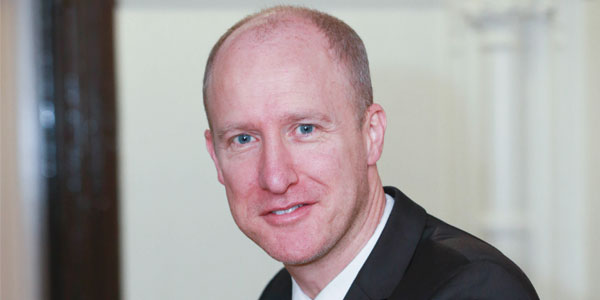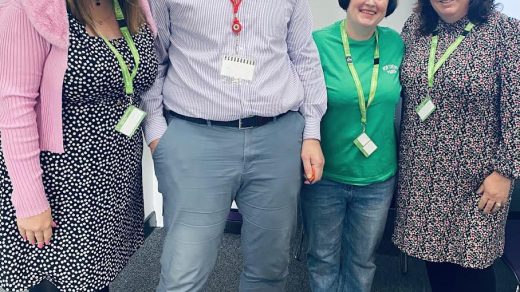Meet the Headteacher Lee Ratcliffe

After spending more than 11 years at Calderstones School, Lee Ratcliffe is easily settling in to his new role as acting headteacher. He talks to Educate about Calderstones’ year of raised expectations and building concrete foundations for future success.
Embracing change
by Hannah Fowler
“I’m not sure that I knew that I wanted to teach when I was at school. If I’m honest, I didn’t have a really clear idea as to what I wanted to do at a young age,” says acting headteacher Lee Ratcliffe. “But I loved English. And I was good at it. I used to read relentlessly. When my parents would turn my bedroom light out I used to crawl to the end of the bed and read using the light from the streetlights.”
So when Lee really started to give some thought in to what he wanted to spend the rest of his life doing, teaching English made sense. Starting in 1999 at Rainhill High in St Helens, Lee spent six years teaching English and was also a head of year. In 2005 he made the move to Calderstones School as head of English, joined the leadership group in 2010 and became curriculum deputy in 2013. In September 2016 he became acting headteacher and is already relishing the experience.
Successful school leaders show great determination, passion and have the willpower to see things through and Lee is unwavering in his commitment to giving pupils the best education. “Headteachers and schools need to be strong and stay true to the principles on which their schools are built,” he says.
Expectations and accountability for schools is more demanding than ever, but Lee believes a school’s vision should always evolve around the pupils in its care. “Ultimately, schools need to do what’s right by their pupils but this is becoming increasingly difficult for some given the external pressures and accountability framework,” explains Lee.
“There may be a tendency for some schools to react to the demands of the new performance tables but doing so would not always be in the best interests of the pupils in their schools.
“Since joining the network of Liverpool headteachers this year, I have to admit that this is something that underpins what is happening across the city: a determination to do what is right by students rather than having knee-jerk reactions to policy and pressure.”
Calderstones School is proud of its tradition for caring for pupils as individuals; as a comprehensive secondary school serving over 1,500 pupils and 200 sixth form students it’s something Lee is keen to celebrate.
“We are a true comprehensive school. It was the thing that hit me most when I first arrived,” he says. “I thought I’d been in diverse comprehensive schools previously but it was only when I came to Calderstones that I realised what this really meant.”
The school is a melting pot of different languages, cultures and religions and it’s this diversity which Lee values enormously. “We have children and parents from every pocket of the Liverpool community here at Calderstones and we’re so proud of how well we embrace and celebrate this,” he says. “We firmly believe that if everyone is reading from the same page and pulling in the same direction, we’ll get there.”
Calderstones engages with various community and student initiatives which put pupils at the heart of the school community. One such initiative is the Student Leadership Project, which provides students with the opportunity to take part in different roles within the school.
“It has given pupils a genuine channel through which they can express their ideas and expend their energies,” explains Lee. “It embraces all year groups, all abilities, and all aspects of school life. Whether its charity leaders, eco leaders, subject leaders, sports leaders, school council membership or form captains; everyone has the opportunity to express themselves and play a full part in the life of the school.”
Lee is not shying away from making improvements and has ambitions to make the 2016-17 academic year one of raised expectations.
“Parents, pupils and staff must be bored of hearing the word ‘expectations’. But for me, this underpins everything,” he says. “If we get this right, if everyone from every part of the school community raises the bar on what they expect of themselves and each other, then we’ll get the outcomes we’re after.”
For Lee this means focusing on short and long term goals for staff and students. “Each week we have both a staff and student improvement focus,” he explains. “This is something that we agree we’ll all strive to be better at by the time Friday comes. And then we strive to maintain that expectation rather than it being a one week fad.”
“For students, the raised expectations have covered things like uniform, equipment, routines, even the consumption of fizzy drinks and their replacement with healthier alternatives.
For staff, we’ve looked at the kind of homework we’re setting, the ways in which we can use common language across lessons, experimenting with questioning strategies. Each week we’re getting better because we’re expecting more; nobody rises to low expectations.”
Looking to the future Lee says the focus will be on happy, healthy, focused and committed staff. “I firmly believe that the single most effective way of improving a school is by improving your staff,” he says.
“The staff set the expectations and agenda for students and these students will follow if they believe in what they’re seeing and hearing, as will parents and the rest of the school community. This will make us better and give us concrete foundations for future success.”



